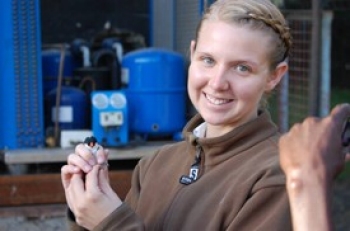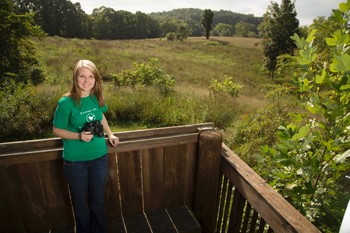RU to graduate its first 'Scholar-Citizen' Saturday

Laken Cooper will be the first RU student to earn a degree with Scholar-Citizen distinction.
Laken Cooper is a model Scholar-Citizen.
When she graduates at Saturday's 2013 Winter Commencement, Cooper, a Radford native, will be the first RU student to earn a degree with Scholar-Citizen distinction.
The unique distinction recognizes students who have demonstrated excellence in their application of academic skills and knowledge to real-world issues through research, leadership and service.
"Students who graduate with Scholar-Citizen distinction have taken courses that have applied experiences and foster reflective practices. It’s about bringing theory to practice," said Erin Webster Garrett, director of RU's Scholar-Citizen Initiative. "Scholar-Citizen projects focus on real-world issues and on promoting positive social and economic change. Some projects involve community-based research or service projects, others involve simulated experiences through case-based learning, complex problem-solving, or critical application of disciplinary knowledge to real-world issues. "
There are a number of criteria each Scholar-Citizen must meet to graduate with distinction, including maintaining a B average or better in Scholar-Citizen courses, developing a Scholar-Citizen ePortfolio that documents the student’s learning and growth over time, joining the Scholar-Citizen Student Club and participating in and leading volunteer and civic engagement projects.
Cooper, a biology major who plans on applying to graduate schools this spring, has more than met the criteria and has done plenty toward applying knowledge she has gained in the RU classrooms and laboratories to real-world situations, both domestically and internationally.
Please select an image.

Cooper first became involved in the Scholar-Citizen program in the spring of 2013 when she learned about and applied for a Scholar-Citizen Highlander in Action (HIA) travel grant.
The grant supported her participation in a three-week research trip to Kenya with Biology Assistant Professor Sara O'Brien. The two traveled to the African nation to work with a team of professors from two other universities as part of a National Science Foundation grant to reveal the reasons house sparrows, an invasive species, are so adaptable.
Cooper was one of two students on the trip and the only undergraduate.
The trip was challenging and a little scary for Copper who had never before travelled internationally. O'Brien had to return home after a week, leaving Cooper in Kenya with the professors from the other universities.
The journey, however, turned into a rewarding experience full of learning and personal growth for the RU student.
"I'm not going to lie; I broke down one night and had some tears," Copper confessed. "But I realized I had to pick myself up because these are people I'm trying to impress for grad school. So, I had to …"
"Put your game face on?," Webster Garrett asked.
"Yeah, exactly," Cooper confirmed.
"Growth isn't always pleasant," Webster Garrett said, "but it's important. And it's important that students have a safe and structured way to process their experiences. The SCI provides that structure."
The HIA grant, which resulted through a collaborative effort between the Scholar-Citizen Initiative, the Office of Career Services and Community Engagement and the Center for Innovative Teaching and Learning, required that Cooper maintain a journal recording her experiences and participate in a one credit course in fall 2013 focused on translating those experiences into an ePortfolio.
Cooper shared her ePortfolio at a public showcase on Dec. 2 with other HIA award recipients. It was through the process of putting her ePortfolio together and reviewing how her expereince in Kenya connected with previous courses, service experiences, and undergraduate research projects that Cooper and Webster Garrett realized she had met the criteria for graduating with Scholar-Citizen distinction.

Laken Cooper shown during her local research into the house sparrow.
In addition to her international experiences, Cooper has done plenty for her community through both service and research. As president of RU's Wildlife Society chapter, she has assisted with several service projects including trash clean-up at Claytor Lake. She also helped rescue mussels stranded on the shore when the lake was drained.
As a member of RU's Ecophysiology Lab, Cooper also conducts research on house sparrows with Biology Assistant Professor Jason Davis at the Selu Conservatory aviary.
Embodying the meaning of Scholar-Citizen, Cooper regularly shares the knowledge she has gained from her classes, research and world-wide experiences.
Sponsored by the Office of Undergraduate Research, Cooper has twice presented her research at national conferences and will present at a third in January.
Closer to home, the first-generation college student goes back to her high school alma mater, Auburn High, regularly to talk with students there about her research and share experiences from her academic pursuits.
"That’s another aspect of her work that really stood out," Webster Garrett said of Cooper's Scholar-Citizen portfolio. "Laken is doing the research, then disseminating the results to others, and turning it into actions."
By her own accounting, Cooper's involvement in the Scholar-Citizen Initiative did wonders for her personal growth. And, in return, she has helped define the role and purpose of the young initiative.
"It's the right program meeting the right student at exactly the right time to help define each other," Webster Garrett explained. "Now, we know more about why this is an important program. Having this distinction for our graduates shows that we’re recognizing Scholar-Citizenship as an attribute of excellence that we aspire for all of our students," said Webster Garrett of the two-year old Scholar-Citizen Initiative.
Cooper's distinction also promises to give the RU community a clearer sense of the initiative's purpose.
"With any new initiative you have to define who you are and what you want to be," Webster Garrett noted. "Since the initiative was created, we have said time and again that the values and dispositions of Scholar-Citizenship are already a part of our culture, but now we’re being very intentional about identifying, celebrating, and understanding it as part of the Highlander ethos, as part of what it means to be a Radford University graduate.
"Laken is that model student who understands what it means to do well in order to do good. That’s a Scholar-Citizen—someone who excels in her studies in order to benefit the public good. She is someone we can all be proud of. I certainly am."